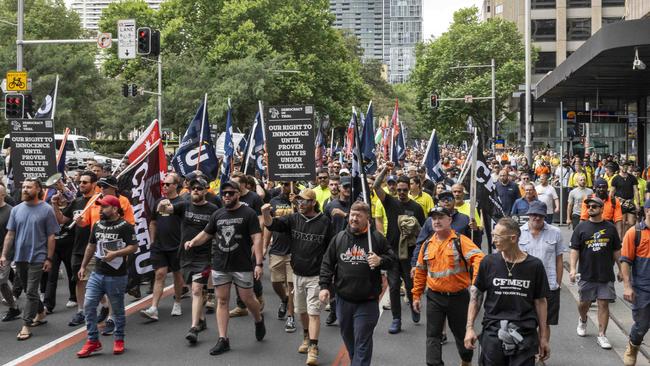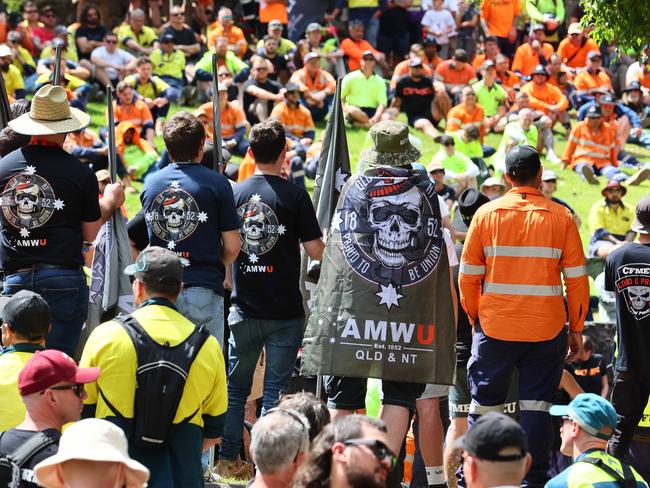Best Practice Industry Conditions policy explained, all the key questions
What is the Best Practice Industry Conditions policy and how does it work? YOUR QUESTIONS ANSWERED

QLD News
Don't miss out on the headlines from QLD News. Followed categories will be added to My News.
Australia’s unions often stir strong debate … then there is the Best Practice Industry Conditions policy.
This entails the extraordinary deals the then Labor state government gifted the unions, further causing controversy across Queensland.
In November 2024 the issue resurfaced after it was revealed Deputy Premier Jarrod Bleijie said Best Practice Industry Principles would be temporarily suspended.
The move, which the Industrial Relations Minister believed could save taxpayers billions, applied to future contracts and projects. Existing contracts weren’t impacted.
So how do the BPICs work? What are the conditions and what has been the debate?
These are all your questions answered >>>

What is the Best Practice Industry Conditions policy?
Then Premier Steven Miles in April defended the policy and said he made no apologies for looking after workers, but the BPIC agreement guarantees those in the construction industry a range of conditions that teachers, nurses and police officers can only dream of.
Some of the conditions in the 269-page BPIC agreement for construction projects include:
■ When it reaches 35C, or 29C and 75 per cent humidity, in South East Queensland, work should cease;
■ Any employee required to work in the rain will be paid double time;
■ Workers on commercial construction works site will be paid a scaled site allowance of up to $11 per hour for projects worth more than $1bn;
■ A worker using their own mobile phone or can be paid an allowance of $100 per week;
■ A worker using an 8m ladder will be paid an additional amount per hour;
■ Workers employed at Mt Isa, except those at Mt Isa Mines, will be paid an additional amount;
■ There will be an Annual Picnic Day for metal and engineering workers, and anyone who has to work will be paid double time and a half.
When did the BPICs start?
Some of the conditions in the 269-page BPIC agreement for construction projects, dated March 27, 2024, were revealed for the first time in April 2024.
Then Premier Steven Miles said: “Government should be an employer of choice, and working on our projects should be one of the best jobs you can get.
“We are not afraid to take steps to ensure workers are properly paid on government projects.
“We are paying what it costs to get the workers to deliver the projects that Queensland needs.”
What does BPIC deliver to workers?
It was revealed in April 2024 that construction workers on government projects could pull wage rises of more than 50 per cent under the controversial BPIC policy – while the state’s teachers, nurses, police and correctional officers languished with single-digit increases.
Industry modelling painted a picture of the impact BPICs would likely have on tradie wages on government projects compared with the industry standard rate, as insiders raised the alarm on the state’s interference in the sector.
But Premier Steven Miles told Queensland’s frontline workers they were doing better than those in other states, saying “they’ll acknowledge that we have some of the best wages and conditions for all of our frontline staff”.
What is the controversy around BPIC?
It was reported in August 2023 that Queensland’s Best Industry Conditions Policy has become a thorn in the side of the state’s civil construction industry – and a costly one at that.
Pushed by Labor left faction mates Ministers Mick de Brenni and Mark Bailey, it has seen firms forced to strike deals with the CFMEU – who insiders say are using the policy to muscle into the civil space, the traditional realm of the AWU.
Senior leaders are left walking out of negotiations perplexed, as union bosses implore them to sign sky-high wage deals and clauses which blowout timelines – with the promise spiralling project bills will simply be covered by the state government.
Master Builders Queensland chief executive Paul Bidwell said the criticism of the BPICs was not about shortcutting safety and undermining workers’ rights.
By the end of November 2024 a series of protests were held in opposition to the BPIC suspensions.

What does LNP plan to do to BPIC?
The state government in November 2024 moved to weaken the CFMEU’s grip on the construction industry and Best Practice Industry Conditions policy, labelling it a rotting sweetheart deal inked with Labor.
Housing and Public Works Minister Sam O’Connor argued the analysis indicated a lack of productivity was affecting the private construction sector.
Transport Minister Brent Mickelberg said he was focused on “stopping the rot”, but was unable to say how BPIC would be disrupted.
ETU Queensland secretary Peter Ong warned the suspension of BPICs would impact workers’ wages despite the Deputy Premier’s assurances.
Mr Ong said “100 per cent” the government could expect more strikes more often as union rally behind workers’ pay and conditions.
A day later the new LNP government promised the plan would save taxpayer billions of dollars and speed up construction.
But Queensland’s trade unions warned the move to temporarily suspend BPICs would cause project timelines to blow out, cut wages and increase workplace deaths.
What have Qlders said about BPIC?
Many Queenslanders backed plans to weaken the Best Practice Industry Conditions policy.
Queensland Treasury “scenario modelling” started under Labor and handed to the LNP government found the controversial BPIC policy could cause up to 22,000 fewer homes being constructed between this financial year and 2029-30.
Many readers claimed to have had enough of the CFMEU, some calling for the union to be disbanded.
Others pointed the finger squarely at Labor, while some offered alternative ideas.
Originally published as Best Practice Industry Conditions policy explained, all the key questions


